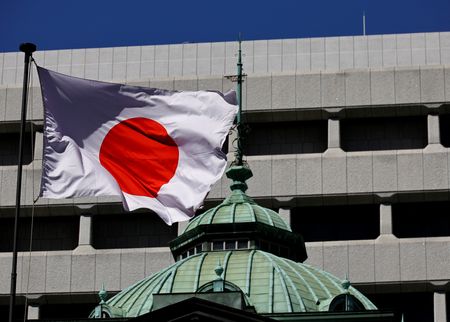By Leika Kihara
HIROSHIMA (Reuters) -Bank of Japan board member Toyoaki Nakamura said on Thursday the central bank must scrutinise various economic indicators, including those on wages and business sentiment, in its deliberations on whether to raise interest rates this month.
The remark by Nakamura, who is considered as dovish on monetary policy, likely keeps alive the chance of a rate hike at the BOJ’s next meeting on Dec. 18-19.
“I’m not opposed to rate hikes. But the decision should be data dependent, and made in accordance with improvements in the economy,” he told a news conference.
“There will be various data coming up (ahead of the December meeting),” such as monthly wage data and the BOJ’s quarterly tankan business sentiment survey, he said.
Following Nakamura’s remarks, Japanese government bond yields rose as some traders revived bets of a December rate hike, after having pared them back just a day ago on media reports the BOJ would be cautious about raising rates so soon.
Markets now see about a 38% chance of a rate increase in December. The government’s wage survey for October is due on Friday and the BOJ’s tankan survey on Dec. 13.
In a speech delivered before the news conference, Nakamura said the BOJ must move cautiously in raising interest rates as consumption remains weak and small firms may struggle to keep increasing wages.
“I am personally not confident about the sustainability of wage growth,” Nakamura said in a speech to business leaders in the western Japan city of Hiroshima, adding that consumption lacked momentum as rising living costs hit households.
While big companies are raising pay aggressively to attract talent, some smaller firms are struggling to earn enough profits to keep doing so, he said.
“We’re at a critical phase where we need to check much data and cautiously adjust the degree of monetary support in accordance with improvements in the economy,” he said.
NO PRESET IDEA
A former corporate executive, Nakamura is seen as among the most dovish members of the board. He voted against the BOJ’s decision to end negative rates in March and the July rate hike to 0.25%.
At the news conference, Nakamura said he voted against the decisions not because he was opposed to raising rates, but preferred to wait until there were sufficient data to confirm that the economy was ready for higher borrowing costs.
“Japan’s economy is still in a recovery phase, so it depends on how that process develops,” Nakamura said on the timing of the next rate hike. “It’s hard to say with any pre-set idea when that timing would be.”
Since the BOJ’s rate hike in July, Governor Kazuo Ueda has stressed the central bank’s readiness to keep hiking borrowing costs if the economy and prices move in line with its forecast.
The governor has also said wages must keep increasing and firms raise prices for goods and services, for the central bank to hike rates again.
However, he has offered no clear indication on when the next rate hike could occur, leaving market expectations fluctuating between December and January next year.
Just over half of economists polled by Reuters expect the BOJ to raise rates again at its Dec. 18-19 meeting.
(Reporting by Leika Kihara; Editing by Jacqueline Wong and Sam Holmes)
